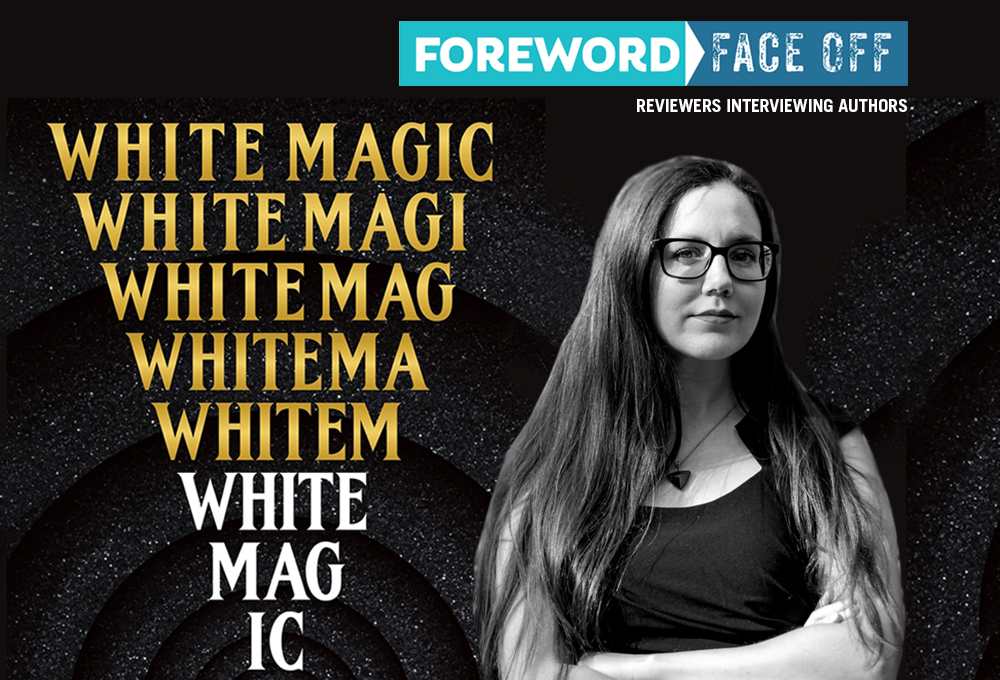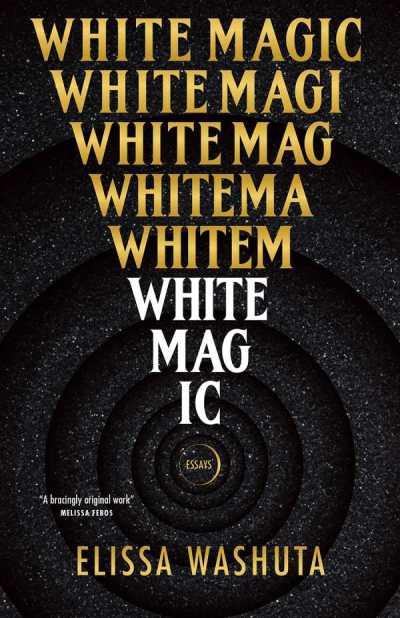Reviewer Danielle Ballantyne Interviews Elissa Washuta, Author of White Magic: Essays

This week’s interview pairs our own inhouse editor/reviewer extraordinaire Danielle Ballantyne with Elissa Washuta, a member of the Cowlitz Indian Tribe and an essayist unlike any we’ve seen before. In her starred review of Elissa’s most recent book, White Magic, for the May/June issue of Foreword Reviews, Danielle says that in “tackling addiction, sexual violence, mental illness, and the colonization of witchcraft, White Magic is a delight and a challenge.” She notes that Elissa was drawn “to the occult as both an extension of her Native heritage, and as a desire to bring some semblance of order to the chaos around and within her. … Washuta’s voice haunts by admitting to being haunted.”

Elissa was gracious enough to field the following questions from Danielle. Kudos to Tin House Books for finding and supporting the work of a brilliant talent.
Let’s start by defining our terms: what does “magic” mean in the context of White Magic? Is it exclusively the practice of Wicca, or does it contain more varied practices, such as tarot and tasseography? Where do you think ancient arts and studies, like astrology or numerology, fit under the magic umbrella, if they do at all?
In the book’s introductory essay, I lay out my magic landscape: I was curious about Wicca when I was a preteen and teenager (I’d seen The Craft), and the still-young internet was already a good place to find binding spells. But I quickly learned that witchcraft was actually a serious thing, and it required initiation and a coven, so I gave up on the notion of becoming a witch. In my late 20s and early 30s, inspired and encouraged by witch friends to try out tarot, I learned about the concept of the “hedge witch,” and I had a therapist who was also a professional astrologer. The occult started to feel less distant than it had when I was surfing the world wide web at thirteen.
In writing White Magic, I quickly lost interest in the idea of creating a full picture of the magic world—I am far from an expert, and I still haven’t even read a nearly 800-page book on the occult I bought in 2018. Astrology and tarot have a presence in the book, in that I became deeply familiar with those practices as tools for narrating my life to myself. Ceromancy and numerology get passing mentions, but I never got deeply into either. Ultimately, all of these practices were ways into the divine for me, and I think of this book’s journey as one toward being able to experience magic without formalized practices because I began to experience the supernatural without trying to make magic happen.
While most every culture in the world explores the supernatural in their own unique way, you point out that modern-day, #gramable witchcraft draws largely from religious practices of Indigenous peoples, sageing perhaps being the most visible. As a member of the Native American diaspora, how has this dichotomy between the popularity of your culture and the ongoing mistreatment of its people impacted you?
Walk into any new age shop and you’re likely to find mass-produced dreamcatchers, shrink-wrapped white sage, and books about spirit animals. I recoil. But to make a crucial distinction, the most commonly appropriated spiritual practices (like the use of white sage) don’t have Coast Salish or Columbia River origins, although we do have some similar knowledge and practices (like sweat lodge). I included very little about the particulars of our medicines and practices because I have no desire to pique settler witches’ interest in adding our plant medicines to their altars.
The United States has been relentless in its efforts to disrupt the transfer of cultural knowledge (boarding schools), sever our relationships with our land (forced removal and incentivized relocation), destroy our sacred sites, erase our languages, and end the things we do that make life worth living. Instagram witches didn’t cause that. But I think the portability and accessibility of our spiritual practices implied by the sale of bundles of sage and the like is harmful—not just because sage is overharvested, but because pulling our spirituality into placeless internet squares tends to deny the fact that in many (maybe all?) of our cosmologies, land and spirit are inseparable. If land didn’t matter, its theft wouldn’t matter. The truth is that my connection with spirits is based in the land.
You talk in some of your essays about the ways in which magic aided you in your struggles with addiction and mental health. While no one is suggesting a substitute for professional help or medical intervention, we could all use a few more supportive tools in our arsenal after the past year. What practices or resources would you recommend for someone considering dipping their toe in?
I’m actually kind of ambivalent about this now—on one hand, tarot helped me look at things about myself and my life I was trying not to see, and astrology gave me an important reminder that time brings change, but on the other hand, I have read into them in ways that dramatically intensified my anxiety. Reading my own tarot cards daily allowed me to stay in a tight spiral of what seemed like a conversation with the universe but really was my anxiety talking to itself.
So that’s the caveat: I still consider these to be tools with the potential of getting to something “real,” but I had to stop paying attention to astrology at some point in 2019 because I had too much fear around the major planetary transits that had been the topic of a lot of discussion in the astrology community: something dramatic, transformative, and terrible could happen, suggested by the Saturn/Pluto conjunction, Jupiter/Pluto conjunction, Jupiter/Saturn conjunction, Saturn/Uranus square, and a bunch of other astrological events in 2020 and 2021.
I would suggest approaching astrology by way of Madame Clairevoyant’s work: her Guide to the Stars speaks to the feature of astrology that I continue to find supportive, which is that understanding my natal chart has been a way to understand myself not as a project to work on with a goal of ridding myself of negative traits, but instead, as a person with an array of features that are just part of me and that I don’t need to bother trying to escape. For tarot, I recommend Jessica Dore and her daily card discussions on Twitter. Her readings of cards are rooted in her knowledge as a social worker, and they’re good prompts for reflection rather than divination.
This interview could not do your book justice without addressing a central theme within it: cultural appropriation. Even beyond the realm of the occult, Western culture has borrowed yoga for their health and wellness and feng shui in their interior design, to name but two examples. Do you feel appreciation rather than appropriation of cultural and religious traditions and practices outside of your own is possible? If so, how should people approach partaking in them?
The cultural appropriation conversation felt like it began to stall and circle after a while, at least on Twitter, and I’m really looking forward to reading Paisley Rekdal’s Appropriate once school’s out for summer, because she’s incredibly insightful and has a way of deftly parting the weeds our online literary world conversations get into.
Definitely, I think appreciation is possible without appropriation, but real appreciation doesn’t mean pulling cultural items/knowledge out of context and incorporating them into the dominant culture without permission. A lot of “appreciation” still does that, and that’s appropriation.
Genuine appreciation requires learning how to interact with the knowledge/art/etcetera on its own terms, and then doing that without straying from established boundaries. I too often get the sense that settler culture is looking for permission in any blurriness in logic around this. When it comes to Indigenous spirituality, the answer is clear to me: the best way to show appreciation is to leave us alone and to demand that federal, state, and local governments stop harming our land. A settler building a sweat lodge does nothing good for me.
Along the same lines, you mention that ethical consumption of materials has become more and more difficult as pseudo-traditional magic “starter kits” and the like proliferate. Do you have any resources you’ve come across to help others who are concerned about this, or any general buying advice?
Buy Native: if you get in the habit of seeing what tribes and tribal members are selling to non-Natives, you’ll have a better sense of what should and shouldn’t be for sale. Know the origins of and current conversations around the practices you want to get into. But first and foremost: a connection with spirits can’t be bought. The tools are just tools. They can be a starting place, but there are many starting places worth trying that don’t cost anything or encroach upon anyone.
Last but not least, are you working on anything right now, or do you have a project in mind to tackle next?
I’m just getting started on it, so this idea could quickly become a relic (such is my process): I’m writing about living between apocalypses. I finally have enough information about my chronic illnesses to begin to write about being sick. I’ve also been learning about the stock market since late 2019—not for a book, but for my retirement—and I feel like the whole thing is held together by twist ties and tape. It’s my decidedly non-expert opinion that something weird is going on—two of the top ten trading losses in history have already happened this year, and #1 not even two weeks ago. Something extraordinary has to be happening for a person to lose ten billion dollars over the course of a few days. This may be boring, but I find it intensely fascinating, so I’m writing about it in my own idiosyncratic way.
Danielle Ballantyne
